|
... Plus
a part history of The Lipton Cup and other long
forgotten sailing issues in South Africa.
© Roy McBride
Part 1
This story starts in 1934 and in Sweden.
A young Yacht Designer, Knud Reimers, then only around
twenty six years old had just designed what was termed
a Cruiser Racer and at just 27 feet long was neither
too small or too large, at a pinch it will sleep four
persons.
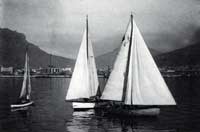 |
The picture
dates from 1965, with Astra on the left,
quite dwarfed by Acushla and Parergon
II in Table Bay.
(click
images to enlarge) |
|
Astra was once one of Cape Towns most successful
race boats, well documented over the years. As often
happens with any wooden yacht that has seen a long
and hard sailing life, age tells in the end. Being
what is termed Carvel Planked, plus having steel floors
inside to both tie the Mahogany Planks on steam bent
Oak frames together. Those steel frames also supported
the one ton lead that was her keel. Over the years
the steel rusted away and gaps started to show in
her tops sides. A succession of owners tried in vain
to keep her watertight by means of cotton caulking,
that in the end was a waste of time and Astra sank
at moorings at the FBYC, Simonstown, South Africa.
She was all of sixty one years old by this time.
| After three
weeks submerged, a combined club and commercial
party raise Astra on July 3rd 1994 |
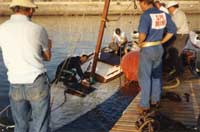
|
|
She was raised by FBYC (False Bay Yacht Club) members
and after a number of years of little or no action,
was eventually placed on to a makeshift trailer and
taken out of the club's own boat park into the Municipal
Car Park, which was close by. The Traffic Police then
gave the club thirty days notice that she had to be
either moved or disposed of. It was now just a matter
of time if she would be Chain Sawed into small bits
of fire wood, or taken out and set on fire in the
bay.
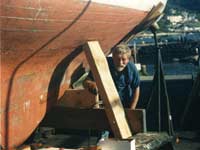 |
Brad (B
Wallace-Bradley) chocking Astra’s
hull onto the road trailer. |
|
This is her story as known to the person who took
on her complete restoration
Circa 1934
When word came out about this new boat design, the
yachting world took notice. At the time the late Uffa
Fox, Sailor, Designer and a personal friend of the
British Royal Family in his ‘second book’
stated that the design was way ahead of its time.
This was enough to spark a lot of interest in Knud’s
new boat and it was soon to be found being built worldwide.
Dimensions
LOA |
- |
27'3” |
LWL |
- |
21'10” |
Beam |
- |
6'3" |
Draft |
- |
4'4” |
SA |
- |
215 sq ft. |
Displacement |
- |
3965 lbs (51% lead) |
| Loading complete,
we head out of the False Bay YC and Municipal
Car Park, in Simonstown. May 1997 |
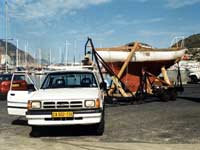
|
|
This was first in Knud’s native Sweden, then
France, Germany, even Australia but Astra, known to
be hull number eight, and out of as many as one thousand,
built over the years. Astra was most probably built
in Sweden, when she was then shipped out on the deck
of a Norwegian Whaler, to Cape Town, South Africa.
There she was first owned by Mr O (Ollie) Hoien-Halls,
a renowned character in the club at the time. We also
know that Astra was imported via Norway. The boat
was a gift from Ollie’s wife. The ship arrived
in Cape Town in June 1935 and given that the passage
will have been a reasonably long one, plus the time
it takes to build such a yacht, it is probably fair
to assume that Astra was built in 1934, if not, very
early 1935. These were the years when Harry Pidgeon
was doing his second world navigation on his five
ton, 35ft Yawl “Islander”. He had been
then sailing single handed for some sixteen years
and when interviewed by a reporter on arrival in Durban,
he was said to almost tongue tied due his lack of
practice at talking!
In that early part of Knud’s design years,
he was having some success with his ideas being accepted.
One well documented story is of a Rear Commodore from
the Chicago YC, Mr Henry Babson, contacting Knud to
say he was interested in discussing the new design
possibly to be used as a ‘One Design’
for his club in the USA. The Rear Commodore planed
to vist Knud when he was visiting Sweden soon.
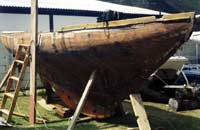 |
Astra,
now safe in the boat park at Hout Bay
YC after a long but safe trip over the
Oude Kappse Weg Mountain pass. With all
paint removed we could see what the actual
damage was and decide what to do next. |
|
This would have been exciting for the young designer
but it gave him problems too. Understanding the importance
of such a visit, Knud booked a table for lunch at
one of Stockholm’s best hotels, the Grand Hotel.
He then used what little money he had to entertain
his visitor. The meeting was closed by the commodore
with a mention that he would contact Knud at some
later time. True to his word, he did. Only this time
the Rear Commodore from Boston, USA, was going to
pay the bill for entertaining Knud, as the Rear Commodore
was in London at the time. A telegram was sent to
Knud who was still in Sweden: could he make the trip
to London to discuss his design further? And if he
could make the trip, all his travel and accommodation
costs would be paid for him. So replying with an affirmative
Yes, off goes Knud to London.
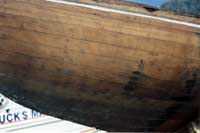 The
condition of the Honduras Mahogany planks
at each end of the boat were fair but the
strains placed on those planks in the boat's
center by the rigging loads, had, over time
opened the boat up. The various owners had
tried many ways to fix them, one being cotton
caulking, not the best idea as that would
allow the planks to move and was very much
the reason I decided to cold mould the boat. The
condition of the Honduras Mahogany planks
at each end of the boat were fair but the
strains placed on those planks in the boat's
center by the rigging loads, had, over time
opened the boat up. The various owners had
tried many ways to fix them, one being cotton
caulking, not the best idea as that would
allow the planks to move and was very much
the reason I decided to cold mould the boat. |
|
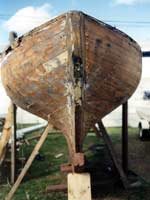 |
Looking
at this tired out old boat, its easy why
some of the guys in the bar and at least
one yacht club were calling me nuts. They
may well be right but we got the boat
back into the water a year and a half
later. |
|
| Many hours
of hard work eventually brought the day
when the actual repair could start. It was
a simple double skin of 3/16” (4mm)
Ockume marine plywood and epoxy. |
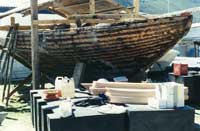 |
|
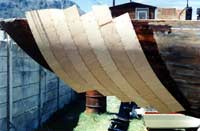 |
Once the
first layer is applied, belt sanded fair,
the gaps are epoxy and teak wood flour
back filled. Resanded, then the entire
process is repeated but with the second
layer of planks facing the opposite way.
The actual angle is not important. |
|
What was actually said is not known but as Knud Reimers
passed away only recently, he may have either written
it down or have told someone. It would be nice to
add to this story if anyone knows. What we do know
is that from that meeting in London, Knud returned
to Sweden with the promise that he would hear from
Henry Babson again. What followed, over time, was
a steady flow of telegrams from Babson, then one with
a first order, then another. Eventually some thirty-six
Tumlarens were ordered and shipped out to the Chicago
YC.
| This is Mike
getting stuck into what was quite a job.
Removing sixty plus years of paint with
stripper and a scraper. The actual timbers
being quite sound in themselves but the
entire unit being a little fragile, so a
layer of ¼” (6mm) marine ply
and epoxy was applied to the outer skin. |
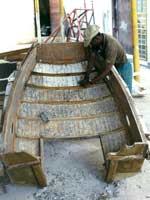
|
|
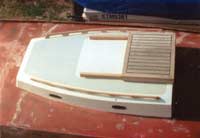 |
The original
repaired coach roof on the new plywood
decks. |
|
Once in Cape Town, Astra was to become one of the
’Royal Cape Yacht Club’s most famous racing
yachts and this is possibly borne out by a choice
of picture that the late Bill Rabinawitz used in his
large hardbound book, ‘A History of the Royal
Cape Yacht Club’, first published in 1995. The
very first page has a picture of three yachts sailing
in Table Bay. In the background is Table Mountain
and the city as it was then, in the foreground are
three yachts, one of which is Astra, the others are
Acushia and Parrergon II - Sail number eight and the
class logo on Astra can clearly be seen in this picture.
The writer is fortunate to have a signed copy of this
volume, as presented to him at presentation at the
RCYC, by Bill himself. Little did I know at that time,
that I would use Bills wonderfull book to research
the history and eventual restoration of Astra.
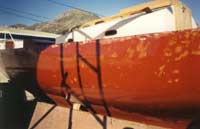 Astra
now has her new decks and restored original
coachroof back on, waterproof inside and
out for the first time in decades. Originality
was a very important part of the job, as
many deck beams that could be reused were
rebuilt and placed back where they came
from. If you look closely you can see where
we have sanded right through the ‘International
Paints’ etch primer. This type of
primer is really easy to use and does not
clog the sandpaper at all. Astra
now has her new decks and restored original
coachroof back on, waterproof inside and
out for the first time in decades. Originality
was a very important part of the job, as
many deck beams that could be reused were
rebuilt and placed back where they came
from. If you look closely you can see where
we have sanded right through the ‘International
Paints’ etch primer. This type of
primer is really easy to use and does not
clog the sandpaper at all.
Credit: INTERNATIONAL PAINTS, Cape Town,
donated all the paints used in this restoration,
that’s a 100% free supply, when
and where we required them. For this I
would like to say a very big “Thank
You!”
|
|
My first connection with Astra was around the time
she was raised from her watery grave and on top of
her mooring block in Simonstown Bay. That will have
been about 1995 after she went down - she was sunk
for three weeks. The committee formed to take over
the boat when her owner, Gordie Kholer, made an offer
to give the boat to the club, if they would promise
to fix her. With my connections in the Marine Timber
Trade I was asked to supply Mahogany lumber. Persons
involved with the boat being saved were Gary Barker,
FBYC diver and the club's yard manager; Captain Wallace
Bradley, or Brad for short, plus many others unknown
to myself.
The Astra committee had regular meetings, they even
get a trust fund open but two years down the line
nothing at all has been done, plus some parts of the
boat's gear had by now gone missing. At one time a
Tramp was living in the boat! It was very fortunate
that Brad had taken a lot of the boats gear to his
home, he had the mast and boom too, the spinnaker
pole having been stolen from inside the boat.
At the annual Traditional Boat Regatta at the V&A
Waterfront, Easter 1997, a full display board was
set up by the 'Save Astra' Committe showing Astra's
state and an offer that it can be yours for free but
you must fix the boat as part of the deal; there were
no takers! This was a period when I was between boats
and had moved our new Dix 43 plywood/epoxy hull and
deck to the Hout Bay YC Boat Park. Having no boat
of my own over the years before that and this Easter
weekend, I normally either borrowed a Traditional
Boat for the weekend, or stayed on a friends. It was
this for reason that Jean ,my wife, never saw the
board offering Astra. She would discover it for herself
the following weekend.
| 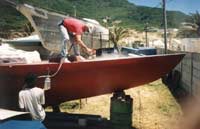 When
I had completed the primer stage, the
two guys who eventually took over the
project from me as Astra’s new owners,
then did me a very large favour in hiring
the services of a proffesional spray painter,
Gary Grinstead & crew, who's workmanship
was incredibly high, saving me lots of
extra work. When
I had completed the primer stage, the
two guys who eventually took over the
project from me as Astra’s new owners,
then did me a very large favour in hiring
the services of a proffesional spray painter,
Gary Grinstead & crew, who's workmanship
was incredibly high, saving me lots of
extra work.
|
|
Back in Simonstown when Astra is finally parked out
in the car park next to the yacht club, the local
traffic police politely take exception and give the
club 30 days to move her. It was the weekend after
the Easter TBA regatta that Jean and myself went to
Simonstown for a breakfast. We then wnet for a walk
around the yacht club. When we saw Astra in her sorry
state, very much to my surprise, Jean says to me,
‘You could fix her easily!’ I have to
say that given our own program building a 43 ft yacht
of our own, I would never have taken the task on without
Jean's approval. The reason for this is that once
I take on a project I am then committed to its completion.
This is not always as easy as it sounds, of course.
At the time, I was remembering the sad days back in
1976 or so when, due to a shortage of available moorings
at the RCYC, old boats were being bought at very low
prices, just to allow access to the Trot Moorings
they occupied. If someone had a large boat they would
buy one of the old Thirty Square class race yachts.
What happened next was one of the saddest things I
have had the displeasure to witness.
Lifted out by the club's fixed crane, they were laid
on their sides, then a gang would attack the hull
with a chain saw until all that was left was the boat's
lead keel. That was then taken to ‘SA Scrap
Metal’ in Salt River, a short drive away, and
sold on. It was all so very cost effective at the
time but what of the boats they were cutting up?
... continued
in Part 2
HAPPY SAILING!!
Roy McBride, founder www.ckdboats.com

Other articles by Roy McBride:

|